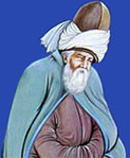
|
|
Rumi—“I have passed beyond all thoughts” Rumi 1207–1273 • Persia and Turkey Rumi has been described as “the most popular poet in America”—a Muslim teacher and scholar who lived 800 years ago in a far corner of the world. Jalál al-dín Mahammud Rúmí is considered the greatest poet in the Persian language and one of the greatest in world literature. Some scholars hold that he was born in the town of Balkh, in present-day Afghanistan. Others now believe he was born further north, in what today is Tajikistan. But because the whole area at that time was Persia, the major portion of which is present-day Iran, Rumi is celebrated in Iran as one of that country’s most illustrious poets. To escape the Mongol invasion into Central Asia, his father moved the family west, eventually settling in Turkey (Rumi is a nickname, derived from the area in Asia Minor called Rum, where the family lived). Early in their westward journey, as the family passed through Nishapur, in Iran, they met the great poet Attar. Attar, seeing the father walking in front of the son and recognizing the son’s great spiritual depth, declared, “Here comes a river followed by an ocean.” Rumi was a school director and teacher as well as a scholar, jurist, and theologian. He believed music, poetry, and sacred dance formed a path for knowing God. His disciples organized themselves as the Mevlevi order, the Whirling Dervishes. His poetry—he wrote more than 70,000 verses—has greatly influenced Muslim thought and literature and has been translated into many languages. At times my state resembles sleep: a misguided person may think it is sleep. Rúmí is telling us about a state that may appear to be sleep from the outside—but deep inside, he says, “my heart is awake.” This is the opposite of what people ordinarily experience, he says—they are awake on the outside, but inside they are “sunk in slumber.” Is he thinking quietly about something? No—“I have passed beyond (all) thoughts,” he declares. With a series of vivid images he strives to draw the contrast between this state and ordinary experience. Then what is he experiencing? “The opening of the door (of Divine grace),” he says. A few lines later he calls it “(a state of spiritual) freedom.” This state lies higher than “the seventh sphere (of Heaven).” At the end he declares, “This is the reality.” Readers familiar with the Transcendental Meditation technique will recognize that Rúmí has transcended the thinking process and is experiencing what Maharishi calls pure consciousness, unbounded awareness. Normally our minds are continuously stirred by perceptions, thoughts, and feelings, much as the ocean is constantly swept into waves by winds and currents. This mental activity obscures the mind’s true nature. But like an ocean the mind can settle down. It can become calm, quiet, silent, while remaining awake. When it does, one experiences the mind’s essential reality—unbounded pure consciousness. This inner field lies beyond thought and feeling, even beyond space and time. The Transcendental Meditation technique enables you to have this experience easily and effortlessly. As your mind’s activity settles inward, you become increasingly awake. Simultaneously your body becomes deeply rested. You experience a unique state of restful alertness, a state of inner silence, peace, and freedom. This state differs from the familiar states of waking, dreaming, and sleeping. In fact, it is a fourth major state of consciousness. Maharishi calls it Transcendental Consciousness. Every aspect of mind and body benefits from this state. Brain functioning becomes integrated, the body dissolves stress and fatigue, and the whole physiology repairs and rejuvenates itself. Twice-daily experience of this state through the Transcendental Meditation technique leads to amazing benefits—increased creativity and intelligence, better health, more fully developed personality, better relationships, even a more peaceful environment. Great poetry endures through the century because it conveys something that is true for all time and relevant for every age. This is Rúmí. With his elegant language, he shares an experience that is both simple and profound—and now available to everyone. REFERENCES [1] The Mathnawi of Jalalu’ddin Rumi, trans. Reynold A. Nicholson, EJ.W. Gibb Memorial Series, n.s. 4 (London: Luzac & Co., 1926), 2:405-406.. © Copyright 2011 Maharishi Foundation USA
|
|

